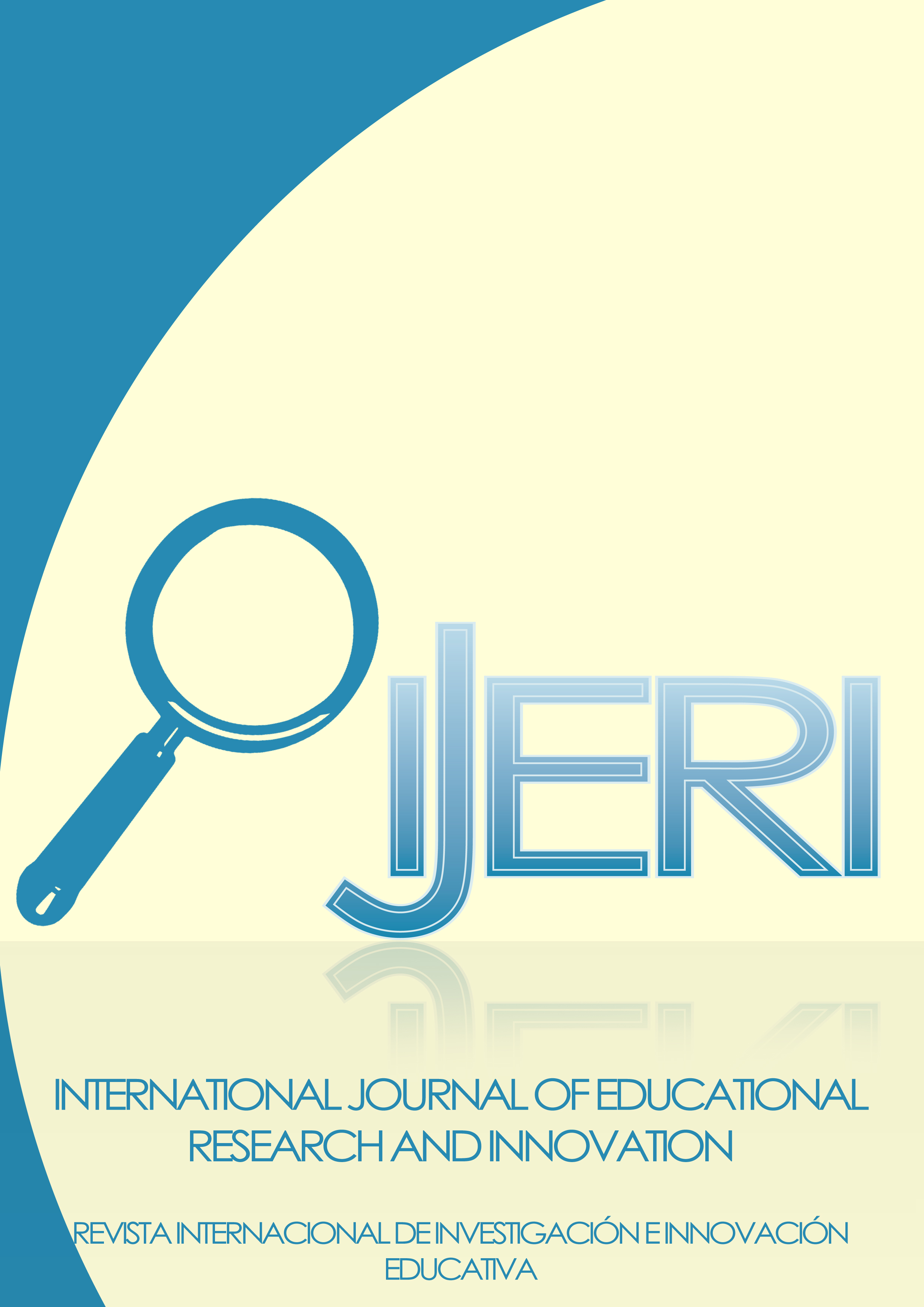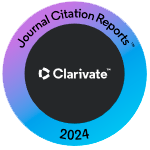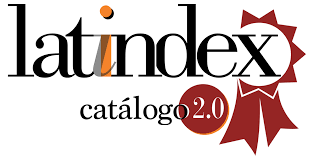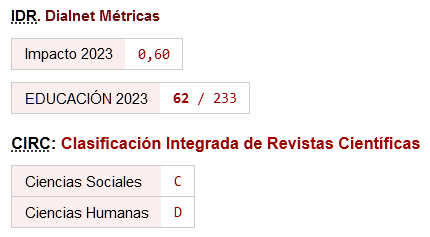Design and validation of the scale to evaluate interdisciplinary work in university students from Ecuador
DOI:
https://doi.org/10.46661/ijeri.7698Keywords:
validation, instrument, questionnaire, interdisciplinary work, students, higher education, EcuadorAbstract
Today students are faced with increasingly complex problems that require approaches that transcend disciplines, since they cannot be addressed in isolation. Interdisciplinarity is conceived as an act of exchange, of reciprocity between the disciplines and a possibility of enriching and integrating the elements of knowledge. The objective of this study is focused on designing, validating and making reliable an instrument that allows to assess the interdisciplinary competences of the students. An instrumental research design has been used in which 600 university students from Ecuador participated. In order to know the psychometric properties of the scale, different analyzes were carried out with the JASP statistical software. Various analyzes were performed, obtaining pertinent values. The correlations between the dimensions were positive in all cases and the factorial weights of each of them showed adequacy of each item with respect to the dimension of which it is a part. Finally, the reliability analysis of the instrument based on Cronbach's Alpha and McDonald's Omega coefficient yielded acceptable results, both for global reliability and for each of the dimensions that make up the instrument. It is concluded that the instrument designed is relevant to assess interdisciplinary skills in Ecuadorian students of higher education.
Downloads
References
Arnal, J., Rincón Delio del, & Latorre, A. (1994). Investigación educativa: Fundamentos y Metodologías. Labor.
Barros, T. y Rodríguez, Á. (2007). Competencias ¿Engaño o certeza? Ediciones Ecuador del Futuro.
Boix-Mansilla, V., Gardner, H., & Miller, W. (2000). On Disciplinary Lenses and Interdisciplinary Work. In S. Wineburg & P. Grossman (Eds.), Interdisciplinary Curriculum: Challenges to Implementation (pp. 17-38). Teacher College Press.
Carmona-Serrano, N., Moreno-Guerrero, A.-J., Marín-Marín, J.-A., & López-Belmonte, J. (2021). Evolution of the Autism Literature and the Influence of Parents: A Scientific Mapping in Web of Science. Brain Sciences, 11(1), 1-16. https://doi.org/10.3390/brainsci11010074
Chacón, M., Chacón, C. & Alcedo, Y. (2012). Los proyectos de aprendizaje interdisciplinarios en la formación docente. Revista Mexicana de Investigación Educativa, 17 (54), 877-902.
Corell-Almuzara, A., López-Belmonte, J., Marín-Marín, J.-A., & Moreno-Guerrero, A.-J. (2021). COVID-19 in the Field of Education: State of the Art. Sustainability, 13(10), 1-17. https://doi.org/10.3390/su13105452
Delgado-Algarra, E. J., Vela-Romero, J. A., López-Meneses, E., & Bernal-Bravo, C. (2022). Citizenship, heritage and inclusive education: construction of a category system for the analysis of didactic experiences. IJERI: International Journal of Educational Research and Innovation, (17), 59–72. https://doi.org/10.46661/ijeri.6511
Fazenda, I. (2015). Interdisciplinariedad: definición, proyecto e investigación. En I. Fazenda (Coord.). Prácticas interdisciplinares en la escuela. (pp. 17- 21). Editorial Octaedro.
Fernández-Río, J., Cechine, J., A., Méndez-Giménez, A., Méndez-Alonso, D., y Prieto, J. (2017). Diseño y validación de un cuestionario de medición del aprendizaje cooperativo en contextos educativos. Anales de Psicología, 33 (3), 680-687. http://dx.doi.org/10.6018/analesps.33.3.251321
Ferreira, M. (2015). Ciencia e interdisciplinariedad. En I. Fazenda (Coord.). prácticas interdisciplinares en la escuela. (pp. 23-28). Octaedro, S.L.
García, R. (2006). Sistemas complejos. Gedisa.
George, D., & Mallery, P. (2014). Ibm Statistics 21 step by step: A simple guide and reference. Pearson.
Hernández-Armenta, I., y Domínguez, A. (2012). Evaluación de Percepciones Sobre la Interdisciplinariedad: Validación de Instrumento para Estudiantes de Educación Superior. Formación Universitaria, 12(3), 27-38. http://dx.doi.org/10.4067/S0718-50062019000300027
Hoelter, J.W. (1983). The analysis of covariance structures: Goodness-of-fit indices. Sociological Methods and Research, 11, 325–344. https://doi.org/10.1177/0049124183011003003
Horn, J. L. (1965). A rationale and test for the number of factors in a factor analysis. Psychometrika, 30, 179-185. https://doi.org/10.1007/BF02289447
Jacobson, M. & Wilensky, U. (2006). Complex systems in education: Scientific and educational importance and implications for the learning sciences. The Journal of the Learning Sciences, 15(1), 11– 34. https://doi.org/10.1207/s15327809jls1501_4
Larrea, E. (2014). El currículo de la Educación superior desde la complejidad sistémica. https://www.ces.gob.ec/doc/regimen_academico/propuesta_reglamento/presentacion%20plan%20excelencia%20luis%20vargas%20torres.pdf
Lattuca, L., Knight, D., & Bergom, I. (2012). Developing a Measure of Interdisciplinary Competence for Engineers. American Society for Engineering Education. https://doi.org/10.18260/1-2--21173
Ledesma, R. (2004). Alphaci: Un Programa de Cálculo de Intervalos de Confianza para el coeficiente Alfa de Cronbach. Psico-USF, 9(1), 31–37. https://doi.org/10.1590/s1413-82712004000100005
Lloret-Segura, S., Ferreres-Traver, A., Hernández-Baeza, A., & Tomás-Marco, I. (2014). El análisis factorial Exploratorio de los ítems: Una Guía Práctica, revisada y actualizada. Anales De Psicología, 30(3). https://doi.org/10.6018/analesps.30.3.199361
López-Belmonte, J., Moreno-Guerrero, A.-J., Marín-Marín, J.-A., & Lampropoulos, G. (2022). The impact of gender on the use of augmented reality and virtual reality in students with ASD. Education in the Knowledge Society (EKS), 23, 1-14. https://doi.org/10.14201/eks.28418
López-Belmonte, J., Moreno-Guerrero, A.-J., Pozo-Sánchez, S., & Marín-Marín, J.-A. (2021). Co-word analysis and academic performance from the Australasian Journal of Educational Technology in Web of Science. Australasian Journal of Educational Technology, 37(6), 119-140. https://doi.org/10.14742/ajet.6940
López-Meneses, E., & Fernández-Cerero, J. (2020). Information and Communication Technologies and functional diversity: knowledge and training of teachers in Navarra. IJERI: International Journal of Educational Research and Innovation, 14, 59–75. https://doi.org/10.46661/ijeri.4407
Marín-Marín, J.A., Moreno-Guerrero, A.J., Dúo-Terrón, P., & López-Belmonte, J. (2021). STEAM in education: a bibliometric analysis of performance and co-words in Web of Science. International Journal of STEM Education, 8, 1-21. https://doi.org/10.1186/s40594-021-00296-x
McCarthy, J. (2015). Learning in the Café: Pilot testing the Collaborative Application for Education in Facebook, Australasian Journal of Educational Technology, 31(1), 67-85. https://doi.org/10.14742/ajet.1500
Minnis, M., John-Steiner, V., & Weber, R. (1994). Collaborations: Values, roles, and working methods (Research proposal). National Science Foundation, Ethics and Values Studies Program.
Mitchell, C. (2009). Zen and the Art of Transdisciplinary Postgraduate Studies: Sydney: Institute for Sustainable Futures, University of Technology. http://altf.org/wp-content/uploads/2016/08/Mitchell_C_Associate-Fellowship_Final-report_2009.pdf
Moreno-Guerrero, A. J., Marín-Marín, J. A., Parra-González, M. E., & López-Belmonte, J. (2022). Computer in education in the 21st century. A scientific mapping of the literature in Web of Science. Campus Virtuales, 11(1), 201-223. https://doi.org/10.54988/cv.2022.1.1019
Moreno-Guerrero, A., Soler-Costa, R., Marín-Marín, J., & López-Belmonte, J. (2021). Flipped learning and good teaching practices in secondary education. Comunicar, 29(68), 107-117. https://doi.org/10.3916/C68-2021-09
Morin, E. (2015). Enseñar a vivir. Nueva Visión.
OECD. (2012). Literacy, Numeracy and Problem Solving in Technology-Rich Environments: Framework for the OECD Survey of Adult Skills. OECD Publishing. http://dx.doi.org/10.1787/9789264128859-en
Parra-González, M.E., Segura-Robles, A., Moreno-Guerrero, A.J., & López-Belmonte, J. (2022). Elaboration and validation of the scale to measure the experience on gamification in education (EGAMEDU). Journal of Technology and Science Education, 12(1), 217-229. https://doi.org/10.3926/jotse.1505
Pérez, Á. (2010). Aprender a educar. Nuevos desafíos para la formación de docente. Revista Interuniversitaria de Formación del Profesorado, 68 (24,2), 37-60. Pozo, J. y Pérez, M. (2009). Aprender para comprender y resolver problemas. En J. Pozo & M. Pérez. Psicología del aprendizaje universitario: La formación en competencias. (pp. 31-53). Morata.
Pupo, R. (2007). El ensayo como búsqueda y creación. (Hacia un discurso de aprehensión compleja). Tabasco, México: UPCH.
Revelo-Sánchez, O., Collazos-Ordóñez, C., y Jiménez-Toledo, J. (2018). El trabajo colaborativo como estrategia didáctica para la enseñanza/aprendizaje de la programación: una revisión sistemática de literatura. Tecnológicas, 21(41), 115-134. https://doi.org/10.22430/22565337.731
Rivero, M., Murillo, G. & Ferrer-Sánchez, Y. (2017). Proyecto Integrador: Herramienta metodológica en la educación superior. Revista Didasc@lia: Didáctica y Educación, 8 (1), 241-250.
Rodríguez-Torres, Á., Naranjo-Pinto, J., Cargua-García, N., Bustamante-Torres, J., y Chasi-Solorzano, B. (2021). La percepción de los estudiantes universitarios en relación con el trabajo interdisciplinario. Revista Espacios, 42 (11), 47-58. https://doi.org/10.48082/espacios-a21v42n11p06
Rodríguez, Á., Mendoza, M. y Cargua, N. (2019). El Proyecto Integrador de Saberes: Una oportunidad para aprender a aprender. EmásF, Revista Digital de Educación Física, 10 (57), 62-77.
Rodríguez-Torres, Á., Fierro-Altamirano, R., Vela-Larco, D. & Quijano-Rojas, M. (2018). La resolución de problemas: una oportunidad para aprender a aprender. Olimpia. Revista de la Facultad de Cultura Física de la Universidad de Granma, 15(50), 160-171. https://doi.org/10.17227/01212494.26pys57.66
Rodríguez, Á. y Naranjo, J. (2016). El aprendizaje basado en problemas: una oportunidad para aprender. Lecturas Educación Física y Deportes, 21(221), 1-12. http://www.efdeportes.com/efd221/el-aprendizaje-basado-en-problemas.htm
Rodríguez, A. (2015). La formación inicial y permanente de los docentes de enseñanza no universitaria del Distrito Metropolitano de Quito y su influencia en los procesos de enseñanza y aprendizaje, la evaluación institucional, el funcionamiento, la innovación y la mejora de los centros educativos. [Tesis doctoral inédita]. Universidad del País Vasco, España.
Roehler, L., Fear, K., & Herrmann, B. A. (1998). Connecting and creating for learning: Integrating subject matter across the curriculum and the school. Educational Psychology Review, 10(2), 201–225. https://doi.org/10.1023/A:1022141720743
Román Graván, P. (2004). Los entornos de trabajo colaborativo y su aplicación en la enseñanza. En Cabero, J. y Romero, R. Nuevas tecnologías en la práctica educativa. Granada: Arial Ediciones, S.L., pp. 213-254. https://grupotecnologiaeducativa.es/images/bibliovir/pedro/2004-entornosdetrabajocolaborativoyaplicacionenseanza-arial.pdf
Segura-Robles, A., Moreno-Guerrero, A.-J., Parra-González, M.-E., & López-Belmonte, J. (2021). Adaptation and Validation of the Motivated Strategies for Learning Questionnaire for Spanish Adolescents. European Journal of Investigation in Health, Psychology and Education, 11(1), 142-153. https://doi.org/10.3390/ejihpe11010012
Sicherl-Kafol, B., & Denac, O. (2010). The importance of interdisciplinary planning of the learning process. Procedia Social and Behavioral Sciences, 2, 4695–470. https://doi.org/10.1016/j.sbspro.2010.03.752
Slavin, R. E. (2014). Cooperative Learning and Academic Achievement: ¿Why Does Groupwork Work? Anales de Psicología, 30(3), 785-791. http://dx.doi.org/10.6018/analesps.30.3.201201
Spelt, E., Biemans, H., Tobi, H., Luning, P., & Mulder, M. (2009). Teaching and Learning in Interdisciplinary Higher Education: A Systemic Review. Educational Psychology Review, 21, 365–378. https://doi.org/10.1007/s10648-009-9113-z
Soler-Costa, R., Moreno-Guerrero, A.-J., López-Belmonte, J., & Marín-Marín, J.-A. (2021). Co-Word Analysis and Academic Performance of the Term TPACK in Web of Science. Sustainability, 13(3), 1-20. https://doi.org/10.3390/su13031481
Van den Beemt, A., MacLeod, M., Van der Veen, J., Van de Ven, A., van Baalen, S., Klaassen, R., & Boon, M. (2020). Interdisciplinary engineering education: A review of vision, teaching, and support. Journal of Engineering Education, 1-48. https://doi.org/10.1002/jee.20347
Van der Gaast, G., Koenders, L., & Post, G. (2019). Academic Skills for Interdisciplinary Studies. Amsterdam University. Press. https://doi.org/10.2307/j.ctvkwnn1t
Wood, D. J. & Gray, B. (1991). Toward a comprehensive theory of collaboration. Journal Applied Behavioral Science, 27 (2), 139-162. http://dx.doi.org/10.1177/0021886391272001
Published
How to Cite
Issue
Section
License
Copyright (c) 2023 Ángel-Freddy Rodríguez-Torres, Nancy-Isabel Cargua-García, José-Antonio Marín-Marín, Antonio-José Moreno-Guerrero, Jesús López-Belmonte

This work is licensed under a Creative Commons Attribution-NonCommercial-NoDerivatives 4.0 International License.











